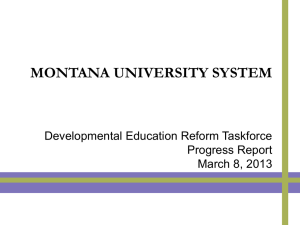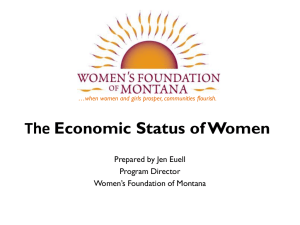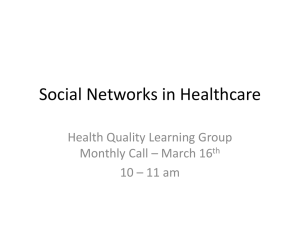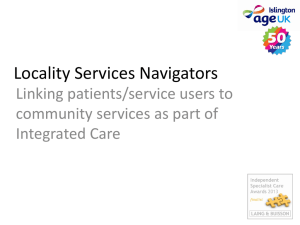New 2013 Montana legislation
advertisement
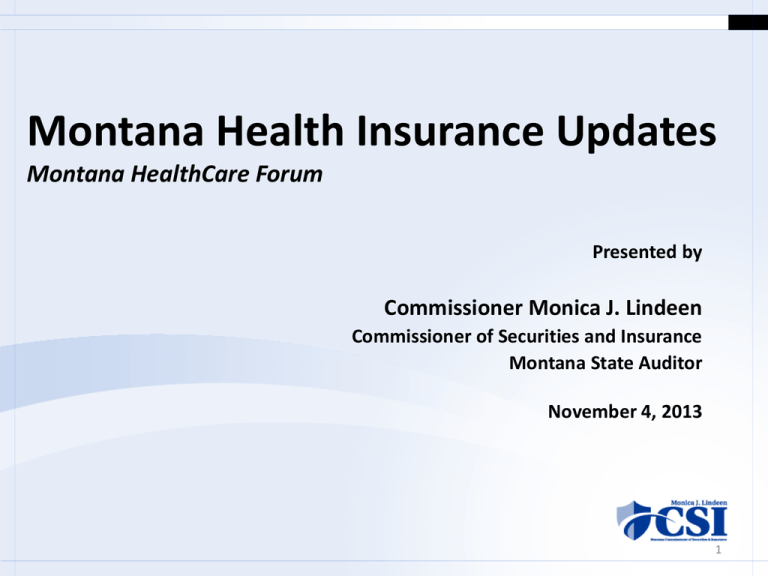
Montana Health Insurance Updates Montana HealthCare Forum Presented by Commissioner Monica J. Lindeen Commissioner of Securities and Insurance Montana State Auditor November 4, 2013 1 2013 Montana Health Insurance Legislation • Rate Review for Health Insurance—HB 87 • Patient-Centered Medical Home Program—SB 84 • Cancer Clinical Trials—SB 55 • Network Adequacy for PPO’s—HB 544 • Navigator/assister/producer training and certification—HB 250 2 State-based Rate Review – HB87 • The CSI introduced a bill to the 2013 legislature to create effective rate review authority for Montana. • House Bill 87 (sponsored by Rep. Welborn) passed and is now law. • For the first time, the Montana insurance commissioner has rate review authority. • Montana has taken back rate review authority from the federal government. 3 Rate Review • In 2014, the ACA requires that adjusted community rating apply to the individual and small employer group markets • Issuers may not vary rates for individuals or small groups based on health status or claims history • Issuers must maintain a single risk pool and may vary rates based on: Age (3:1 maximum) Tobacco use (1:5:1 maximum) 4 geographic areas in Montana 5 Benefits of Rate Review • Montana consumers have already benefited: – One company lowered rates by 7 percent. – A second lowered rates by 22 percent. – A third company lowered rates by 66 percent. 6 Patient-Centered Medical Homes – SB84 • A Patient-Centered Medical Home (PCMH) is a model of health care delivery that emphasizes primary health care, coordinated care and prevention. • In the PCMH model, insurers pay an incentive based on quality of care, rather than quantity. • SB 84 establishes standards and structure for a statewide PCMH program. • SB 84 requires CSI to adopt rules to implement provisions of the law. 7 Implementing the Montana PCMH Act • Administrative rules were published at the end of September. • Appoint the stakeholder council on November 8. • Establish a process for recognizing which accrediting organizations meet Montana’s standards. • Begin qualifying practices and payers who meet the decided standards in December. • Educate the public and promote PCMH across Montana. • Working now to incorporate Montana specific standards. 8 Cancer Clinical Trials Senate Bill 55 • Passed by the 2013 Montana legislature to clarify coverage of routine costs for patients in approved clinical trials must be covered. • Went into effect immediately upon passage. • Helps remove insurance uncertainties for doctors and patients, allowing them to focus on fighting the disease instead of coverage for routine costs. • Addresses confusion and inconsistency in coverage of routine care patients receive when undergoing a clinical trial. SB55 Implementation • Note that the state law covers cancer only, but the ACA has a similar provision that covers “all life threatening diseases.” (effective 1-1-14) • CSI is still noticing insurance denials of routine care claims. When we explain the law to the company, they pay the claim. • CSI will be issuing guidance to insurers soon to remind them of the law. • The advisory council developed an Oncology Clinical Trial Treatment Notification Form. – The form is being finalized and is intended to be set as a statewide standard for communication on trials between providers and payers. – CSI will continue education like today to the provider and payer community to ensure the greatest benefit of the law to Montanans. 10 Network Adequacy – HB544 • A new network adequacy law in Montana was effective October 1, 2013. Most “network-type” health insurance plans, including dental and vision, sold in Montana are “PPO” plans. – The consumer’s cost-sharing is increased if he/she seeks coverage from “out-of-network” healthcare providers. Consumer cost-sharing is substantially reduced or even eliminated if that consumer seeks healthcare services “innetwork.” • The new law says that a provider network is deemed adequate if it includes 90 % of the hospitals and 80 % of the healthcare providers in the state. • Below that threshold percentage, the commissioner may “determine” a network to be adequate. 11 Network Adequacy cont. • Below that level, a maximum differential is applied: no more than 25 % cost-sharing difference that the consumer pays for out-of-network services. • The commissioner will disapprove a network plan as “misleading” if there is no viable network. • Cost-sharing differences between in and out-of-network are significant—as much as four times higher. Consumers should always check the insurer’s list of in-network providers before they choose a health plan. • Many of the benefits of the ACA are based on “in-network” costs only. 12 Assistor State Certification– HB250 • All navigators, Certified Application Counselors (CACs), and Certified Exchange Producers (CEPs) must complete federal and Montana-specific training be certified. • CEPs must complete federal and state training to sell products through the marketplace. • CSI developed state-specific training materials. Navigators must pass a background check and take a test. • CSI has a list of all certified navigators, CACs, and agents on www.montanahealthanswers.com. Navigators and CACs The ACA allows for two new consumer assistance roles • Navigators – contracted through grants from HHS, responsible for performing outreach and education, as well as enrollment assistance • Certified Application Counselors – not paid by exchange or federal grants—only offering enrollment assistance • Intended for current employees of medical providers and community groups Navigators and Agents Similarities and Differences • Both navigators and agents help consumers by providing marketplace enrollment assistance. • Navigators operate only within the Marketplace. • Unlike agents, navigators cannot be compensated in any way by insurers. • States cannot require that navigators be licensed producers, but they do need state certification and training. • Navigators and CACs may NOT recommend specific insurance products. HB250 Implementation • In addition to their federal training, CSI required an online state training for all 3 types of assistors. • CSI created to 90 minute webinars, both were required for CACs; one was required for Navigators. • Weekly calls with Navigator groups. • CSI is a continuous resource for CACs and Navigators. • Ongoing regulation of all 3 roles. 16 Certified Assistors as of October 25, 2013 • Certified Application Assistors: 69 • Navigators: 26 • Certified Exchange Producers: 291 17 Montana Specific Training Included: • Montana specific information on Medicaid and Healthy Montana Kids eligibility • American Indian ACA benefits • Montana specific privacy laws • Unlicensed producer activity and the consequences • Background information on plan design structure and how to choose a plan • Deductibles and other cost-sharing • Financial and health considerations • Network Adequacy • Prescription drug formulary • Summary of Benefits and Coverage • Multi-State Plans • Autism and Mental Health Parity • Stand-alone dental plans • How to help people who aren’t eligible Affordable Care Act Marketplace • Montana’s federally built, federally maintained Marketplace website is not working properly. • www.montanahealthanswers.com, visited by more than 11,000 individual Montanans. • We’ve answered nearly 1,000 questions from our Ask Away site. • Our office has hosted dozens of town hall events to explain the law. 19 Adjusting to Marketplace Problems • Continue to do outreach and education. • Work with assistors to adapt to problems and help consumers. • Answer questions through the website. • Montana website made more shopper friendly with a calculator and charts on plan structure and cost break down for people to view without having to go to healthcare.gov. • I met with an HHS official just last week to tell my concerns and find out when a fix is expected. 20 Montana is a Plan Management State for the Marketplace • The CSI works with the federally facilitated marketplace to alleviate duplication and save consumers time and money. • This coordination helps preserve the state regulation of health insurance. • CSI’s plan management duties includes: – Recommending qualified health plans to the federally facilitated marketplace. – Using rate review authority to review health insurance rates and their benefits. – Monitoring insurance companies for compliance with state and federal law. Questions? Call my office 1-800-332-6148 Or visit www.csi.mt.gov www.montanahealthanswers.com

